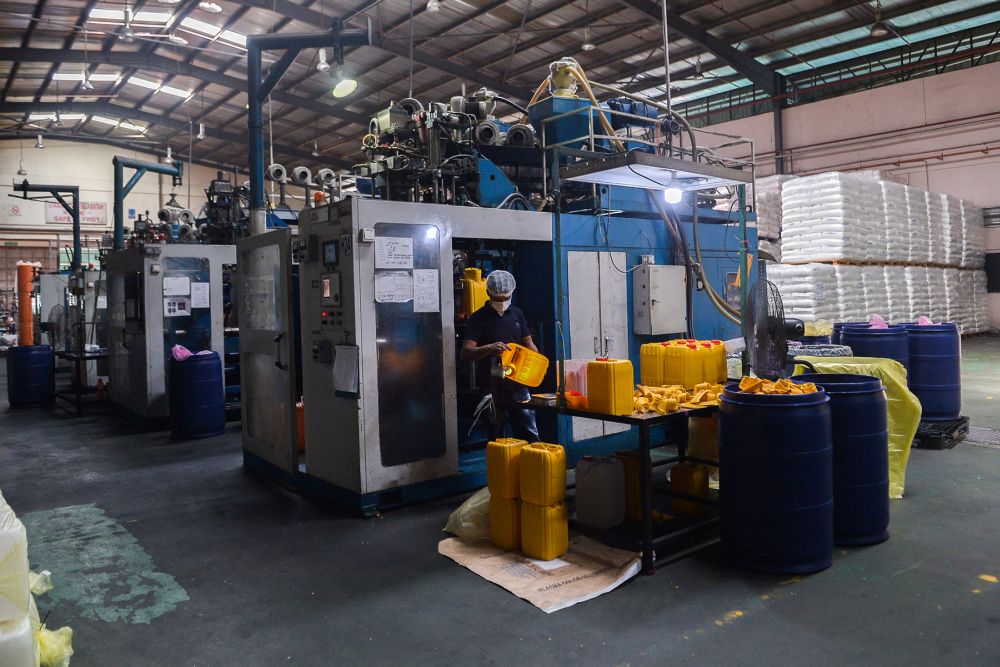The continued runaway infection rate has prompted the public to blame factories because they have been allowed to remain open. — Picture by Miera Zulyana
KUALA LUMPUR, July 14 — The Federation of Malaysian Manufacturers (FMM) raised concern today about media reports that suggest factories as the cause of rising daily Covid-19 cases, which it said is a misperception that has fuelled public anger towards employers.
The number of active infection clusters linked to workplaces account for only a third of daily positive cases, according to data from the Ministry of Health (MoH) that the industry cited in a statement, calling for the government to clear the air and loosened restrictions for factories.
“Tan Sri Dr Noor Hisham Abdullah, Director-General of Health, was also most recently quoted during an engagement with the business community on July 4, 2021 that of the total cases, close to 70 per cent were sporadic cases,” the FMM said.
“Thirty per cent came from clusters of which 62 per cent are workplace clusters. Factories only account for 30 per cent of these workplace clusters. This works out to be around only 6 per cent of the total number of cases that can be attributed to factories,” it added.
Daily Covid-19 cases hit a record high of over 11,000 yesterday and Dr Noor Hisham had warned that the numbers could climb further in the next “one or two weeks”, citing the new and more contagious Delta variant as one of the possible causes behind the sharp spike.
This is despite most districts and localities in the Klang Valley area having been placed under the tightest movement restriction since July 3 as public health authorities try to stem the disease.
The continued runaway infection rate has prompted the public to blame factories because they have been allowed to remain open, and fuelled talks that the current lockdown could extend beyond July 16.
Movement restrictions have already exacted a heavy toll on livelihood and public mental health. Officials estimate the economy is losing RM1 billion daily because of the closures. The unemployment rate is also expected to climb.
The FMM, echoing concerns expressed by other industries, said the forced shuttering of factories would deal a heavy blow to exports. Dozens of factories in Selangor and Kuala Lumpur that produce non-essential items have been asked to halt operations temporarily.
This comes even as manufacturers have proven to practice strict Covid-19 standard operating procedures, the group asserted as it called for the government to implement a more targeted approach to the lockdown.
“It is important that the government makes its lockdown decisions based on science and data, and not on misconception,” the federation said.
“Close only specific companies where cases of Covid-19 cases are detected but not declare EMCO on an entire area/district or state and impose strict operation conditions on all businesses, as it is unfair to unaffected companies especially those that have a clean record and have maintained the highest levels of SOP and workplace preventive measures.”
MoH reported recently that only 15,069 (9.7 per cent) out of a total of 156,105 infection cases from June 1 to June 26 were attributed to the manufacturing sector.
The FMM noted that Dr Noor Hisham Abdullah was quoted saying on July 9 that only 16 per cent of the record high 9,180 cases reported for the day were from clusters, while the remaining 84 per cent were based on testing of individuals.
Misplaced public anger towards manufacturers could have influenced the government’s decision to shut down the factories, the FMM speculated.
“With the rise in sporadic cases, managing the entry of infections into the factory or hostels has become more challenging for the industry… because the virus may still go into factories especially through the asymptomatic sporadic cases,” the group said.
“These sources of infections are often not traced back to the community where it most likely originated from,” it added.

